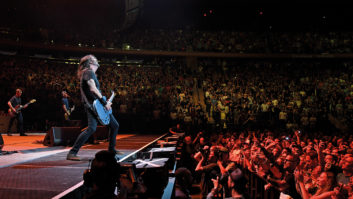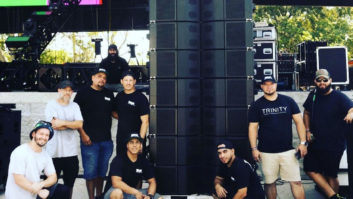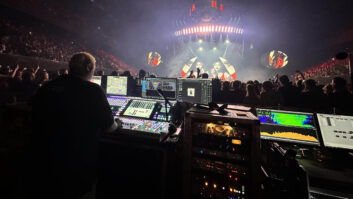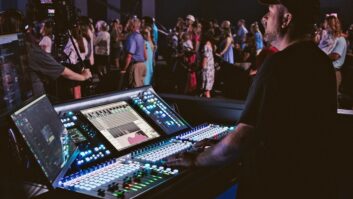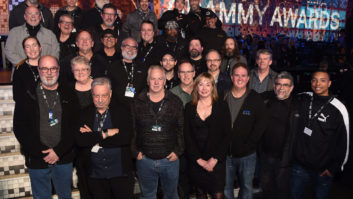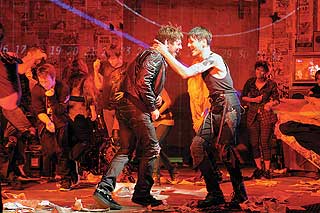
By the time you read this, American Idiot will have premiered on Broadway, with SR support from Masque Sound.
Photo: Courtesy Mellopix.com
While the music industry as a whole continues to face challenging times, with sales of even the most popular albums decreasing year to year, and the rise of individual digital track purchases still not compensating for the volume of losses, the live touring industry has remained relatively robust. As M.L. Procise, senior touring director of Clair Global, the world’s largest touring sound company, remarks, “It seems that especially in tough times people want to escape and go out and see bands that they love—somehow they find the money for it.” Dave Shadoan of another giant audio company, Sound Image, agrees…to a point: “People are still going to shows—most of the big tours are doing okay—but there are also a lot of people who, because of the bad economy, can’t go as often, or they’ll stay away from the high-priced shows. For a lot of people, ‘disposable income’ is down to a husband and wife going to dinner and a movie. The trip to the Mouse House [Disney World]—people aren’t spending that money now.”
Indeed, on the surface, glancing at the top tours of last year it looked like good news all around. Led by U2’s amazing 360-degree stadium shows—all of which sold out and which are on track to do so again this year—and buoyed by popular tours by the likes of Madonna, AC/DC, Bruce Springsteen, Metallica, Elton John and Billy Joel, The Eagles, and Kenny Chesney, many arenas and sheds were filled to capacity. That’s the good news. The less than great news is that the support overall for many tours was “thin”—i.e., demand for some perennials (like Springsteen, for example) was not as great as in previous years—and many of the summer amphitheater acts performed for full houses only because of a plethora of heavily discounted seats. And although many look at 2009 as the crater of the recession, with some economic indicators looking up (marginally) for 2010, the continuing high unemployment rate and an overall lack of confidence in the nation’s economic fortunes have the potential to actually make this a tougher year than last year on the live sound front domestically. One harbinger may be the upcoming Eagles/Dixie Chicks/Keith Urban tour, which has been ambitiously booked into a number of stadiums in large markets.
“It’s too early to tell how the summer season is going to be,” says Gary Bongiovanni, editor in chief of Pollstar, the leading live music industry publication. “If you look at what’s going to be out there, it’s a lot of the same music that’s been out there every year. In the summer you see a lot of the boomer bands combining in twos and threes to try to do another tour of large venues, and for the most part those have done fairly well. The outdoor festivals that are coming, like Coachella and Bonnaroo, will probably do fine because they get big acts and they’ve also established themselves as places people want to go, no matter who is playing. And country has proven to be dependable, too, year-round. What’s interesting about that market is it’s largely newer acts. If you look at who sells a lot on the rock side, you’re looking at Springsteen and U2 and The Eagles, AC/DC—all these acts that have been around for decades. But in country it’s Zac Brown, Lady Antebellum, Taylor Swift, Rascal Flatts… It’s going to be interesting to see what happens when the Rolling Stones are no longer around and Paul McCartney is no longer around and Springsteen isn’t touring anymore. Who will take their place at the upper level? It’s hard to say.”
Glamorous names aside, the live sound business is much more than just the top-grossing touring acts, of course. It is clubs and auditoriums, church installs and corporate events, conventions, legitimate theater, wineries and Indian casinos—an incredible panoply of microbusinesses, each an economy in itself. And looking at this deeper landscape, the results are perhaps more mixed than they are at upper strata of big music tours. We recently spoke with reps from a handful of top sound reinforcement companies to get a sense of the market’s strengths and weaknesses.

Each stop at U2’s 360-degree tour was sold-out, showing that music lovers continue to show interest in live performances.
Photo: Steve Jennings
Paul Owen, owner of Thunder Audio (Livoria, Mich.) says, “We’ve stayed busy by doing different levels of acts. We still have the megatours: Metallica has been out for over 18 months now; it’s going to continue on at least until December, and who knows if they’ll actually stop then. I hope not!” he laughs. “But the market is changing all the time. There are a lot of bands that people really want to go see that have been launched through YouTube and MySpace and things like that—those are great marketing tools for these new bands. We have one indie band that has done extremely well—Vampire Weekend, who have grown tremendously in the last couple of years and are playing some larger venues now. Bands are basically doing their own marketing for their own exposure, as opposed to when you used to hire a whole team from a record company, which handles distribution, marketing and everything else.
“We do a lot of rock, obviously,” Owen continues, “but for the past 15 years we’ve also taken care of what are called ‘chitlin’ players.’ We’ve looked after [African American film director/comedian] Tyler Perry for 15 years, and now that’s gone on to a full-blown arena tour of a play [Madea’s Big Happy Family] that’s been out now since January, finishes in May and continues on in September for the rest of the year. One of the big challenges with that one is it was always done in theaters and so the scale has changed in the arenas but you want it to have the same intimacy. It’s got full-on video, lighting, a Meyer audio package. It’s impressive. And now we have another one going out called Church Girls that has a similar theme but smaller. We’ve paid a lot of attention to that market, and it’s definitely reaping rewards for us.”
Another observation from Owen: “More people doing regional tours. With a lot of the large permanent installs that have gone into casinos and Hard Rock Cafés and other venues, and fuel prices being so high, there are a lot of bands that normally would have toured five to ten years ago with full production, will now tour with just two digital consoles, some racks and put it in a trailer behind a bus, where they might have had a full truck—or more—of production.”
Over at Eighth Day Sound (Highland Heights, Ohio), executive VP Jack Boessneck is finding that there are two main pressures being exerted by clients: They want more for less, but they still want the most technologically advanced equipment available. “I don’t know anybody who has walked into any place—even if it’s the local hardware store—within the last 18 months and not expected a deal. If a product and/or service is negotiable—and everything is negotiable—that’s the way it is. So, maybe your margins change a little. You work harder, you work smarter. But if you start cutting your product or cutting your service, or cutting anything, you lose. You can’t cut your edges. Why are we doing well? Because we’re competing in the marketplace.”
Like other live audio companies, Eighth Day has always sought a broad range of clients. They handle tours by everyone from Lady Gaga (“We’ve been with her from the beginning,” Boessneck says), to Tom Jones, Whitney Houston, Jay Z and the Lord of the Dance extravaganza. “I love them all!” Boessneck says. “I like to joke, ‘We don’t pick the bands we do. Satan’s Salad Bar is my very favorite band if they pay the bills!’”
Boessneck, too, is finding more tours not requiring full production, with an upside being that more groups can afford to tour: “I think it’s actually led to a little more work for everybody,” he says. Also, the smaller footprint of some of the newer digital consoles, and the increasing use of plug-ins (instead of racks of analog outboard gear) has meant less heavy equipment being lugged around, which saves money. “Let’s face it: Computers have changed everything,” he comments. “Sometimes we don’t feel like a sound company; we feel like an IT company.” Asked about the coolest piece of new gear that his clients are requesting, he immediately responds, “The DiGiCo SD7. People love ’em.”
Overall, Boessneck sounds remarkably upbeat. “Why wouldn’t I be upbeat? I’m in the sound business, not the auto or banking industry. The economy isn’t great, obviously. We haven’t totally turned the corner. But how many sound companies went out of business last year? Zero that I know of that even play on a large regional level. And last year was worse than this year is supposed to be.”
Geoff Shearing of Masque Sound (East Rutherford, NJ) comments, “We’re doing better than a lot of people because of the diverse group of clients we have, and, fortunately, Broadway seems to be holding its own.” Masque was started in the mid-’30s by a trio of Broadway stagehands—including Shearing’s grandfather—and both New York-based and touring musicals and plays still constitute a significant part of the company’s revenue; among its current productions are such hits as Mamma Mia!, Billy Elliot, The Phantom of the Opera, Jersey Boys and the recently opened American Idiot and The Addams Family.
“We’re still facing a big transition in terms of finding any sort of standard for digital consoles [on Broadway],” Shearing offers. “It used to be that Cadac was on probably 90 percent of the shows; now it’s a mix of different platforms with no clear best choice. The other thing about digital is it goes obsolete so quickly. It’s a whole new paradigm in terms of pricing models for us; honestly it makes it more difficult to earn a living. So we have to pay very close attention to inventory levels. In my grandfather’s day, he could rent a piece of equipment for 30 years, literally. Now we’re lucky if we get three.”
Masque does a considerable amount of broadcast work, “and we’re also doing a lot of installations now for performing arts spaces and churches. We have a lot more to offer than your typical audio-visual contractor. We have a facility that’s capable of going 24/7, so we always have support available, we have a large inventory of items, we have trucking and a full-time staff of people who know audio. People want to deal with a company that’s been around for a while. We also own Professional Wireless. Some of the corporate stuff has gone away, but it’s creeping back a little bit now. With installs, the budgets have been approved and they are in the pipeline, so that’s been very good.”
Don’t get Dave Shadoan, president of Sound Image (Escondido, Calif.), one of the largest SR companies in the world, started on the subject of the shrinking corporate-event market: “It’s way off, and you can thank our government for that. They got on TV and chastised corporations for having jets and big parties and everything else. I understand talking to someone like General Motors, who’s losing $4 billion a quarter, for throwing a big soiree, but what happened to the corporate market is everybody got put on watch and they’ve stopped spending money on corporate events. If you go to Vegas, they’ll tell you it was the government because they started chastising these large corporations. Call Orlando. Call San Diego. They’ll tell you the same thing. For example, a large corporation used to put on 15 corporates a year worldwide; they’ve downscaled it to three. And they were very big corporate shows. The end is nowhere in sight because the economy has yet to stabilize. You have a bunch of people who are apprehensive to do anything because they’re afraid the federal government will accuse them of squandering funds. But they were never squandering funds—the reason they had their big corporate events is they brought in their sales teams, they familiarized their personnel with one another and formalized their business plans for the upcoming year; they had a purpose to them. Yeah, they had some fun. And they should. It’s their money. Our own government scared these guys out of doing their job.”
That said, Sound Image isn’t exactly hurting. They continue to handle many big and small tours—Rage Against the Machine, Tom Petty and The Heartbreakers, Jimmy Buffett, Lenny Kravitz, Santana, Elvis Costello, Billy Idol and Heart, and the lion’s share of big country tours, including Brooks and Dunn, Taylor Swift, Brad Paisley, Toby Keith, Rascal Flatts and Easton Corbin—and “our contracting department grows gradually every year and we’ve invested multiple millions of dollars in touring over the last two years. In one year we bought 1,200 Crown HD 12000 series amplifiers, we bought another 72 VerTec boxes this year, and we also bought a K1 system from L-Acoustics [for the Tom Petty and the Hearbreakers tour]. We put a purchase order in today for six new digital consoles when we already have a substantial inventory—this particular purchase was Digidesign Profiles and VENUE consoles. We also continue to purchase Digidesign SC48 and Yamaha M7CL boards, which are basically band-in-a-bus consoles.
“Now is the time you want to grow your company because the touring business has been pretty good, and when [this economy] comes out the other end of the tunnel, the people who continued to invest in technology, people and services are going to be the big winners.”
Finally, at Clair Global (formerly Clair-Showco, Lititz, Penn), which M.L. Procise says “at any given time probably has 45 percent of [the touring] marketplace on the conservative side, to 60 percent,” things keep humming along: In March alone they had nearly 50 tours going, including such names as Paul McCartney, Guns N’ Roses, Black-Eyed Peas, Eric Clapton and so many more. “We’re continuing to develop new and diverse products that meet the needs of any kind of venue. We’re truly a global company, so all our equipment, our AC systems, crossover systems, cabling systems, our crew philosophies are standardized worldwide, whether you’re in Sydney, Tokyo, Basel, London, Toronto, Nashville, L.A., Lititz, Chicago. You get the same equipment, you draw from the same crew pool to operate that equipment, so everybody is on the same page. That’s important.” Clair (and Showco) were, of course, responsible for numerous touring sound innovations through the years, including the Prism, S4 and more recent i-5 systems, among others, and they continue to mix proprietary gear with thousands upon thousands of pieces by dozens of manufacturers for their ever-growing worldwide business.
“Of course equipment is important,” Procise says, “but it’s still a people business in the end, and it’s the responsibility of the sound company to bridge the technology gap on field service. I like to think our guys are the best in the world. We go to the finest vocational schools and musical engineering programs to recruit the best people with the highest aptitude and best grades—people who want to do what we do for a living. Because this is our life. Maybe you can’t be on the softball team or in a bowling league or have a family right away. This is hard work that requires a lot of commitment. This isn’t just repairing a bad module in an analog console anymore. There’s a ton of different things to do. And in this day and age you have to have people who can do it all.”
Blair Jackson is
Mix
’s senior editor.
